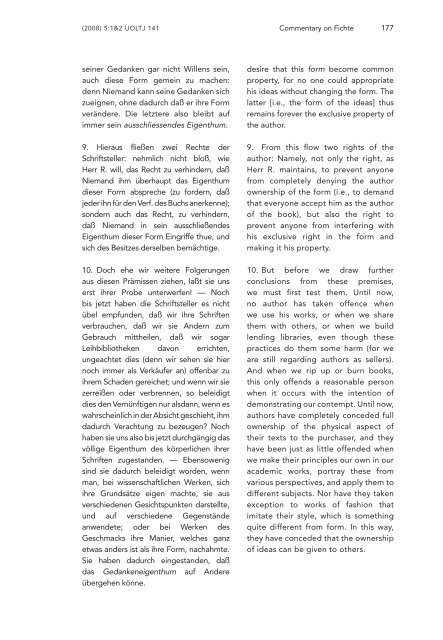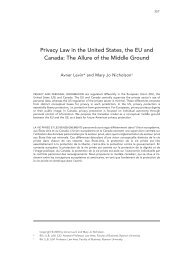Commentary on Fichte's “The Illegality of the Unauthorised ... - uoltj
Commentary on Fichte's “The Illegality of the Unauthorised ... - uoltj
Commentary on Fichte's “The Illegality of the Unauthorised ... - uoltj
Create successful ePaper yourself
Turn your PDF publications into a flip-book with our unique Google optimized e-Paper software.
(2008) 5:1&2 UOLTJ 141<br />
<str<strong>on</strong>g>Commentary</str<strong>on</strong>g> <strong>on</strong> Fichte 177<br />
seiner Gedanken gar nicht Willens sein,<br />
auch diese Form gemein zu machen:<br />
denn Niemand kann seine Gedanken sich<br />
zueignen, ohne dadurch daß er ihre Form<br />
verändere. Die letztere also bleibt auf<br />
immer sein ausschliessendes Eigenthum.<br />
9. Hieraus fließen zwei Rechte der<br />
Schriftsteller: nehmlich nicht bloß, wie<br />
Herr R. will, das Recht zu verhindern, daß<br />
Niemand ihm überhaupt das Eigenthum<br />
dieser Form abspreche (zu fordern, daß<br />
jeder ihn für den Verf. des Buchs anerkenne);<br />
s<strong>on</strong>dern auch das Recht, zu verhindern,<br />
daß Niemand in sein ausschließendes<br />
Eigenthum dieser Form Eingriffe thue, und<br />
sich des Besitzes derselben bemächtige.<br />
10. Doch ehe wir weitere Folgerungen<br />
aus diesen Prämissen ziehen, laßt sie uns<br />
erst ihrer Probe unterwerfen! — Noch<br />
bis jetzt haben die Schriftsteller es nicht<br />
übel empfunden, daß wir ihre Schriften<br />
verbrauchen, daß wir sie Andern zum<br />
Gebrauch mit<strong>the</strong>ilen, daß wir sogar<br />
Leihbiblio<strong>the</strong>ken dav<strong>on</strong> errichten,<br />
ungeachtet dies (denn wir sehen sie hier<br />
noch immer als Verkäufer an) <strong>of</strong>fenbar zu<br />
ihrem Schaden gereichet; und wenn wir sie<br />
zerreißen oder verbrennen, so beleidigt<br />
dies den Vernünftigen nur alsdann, wenn es<br />
wahrscheinlich in der Absicht geschieht, ihm<br />
dadurch Verachtung zu bezeugen? Noch<br />
haben sie uns also bis jetzt durchgängig das<br />
völlige Eigenthum des körperlichen ihrer<br />
Schriften zugestanden. — Ebensowenig<br />
sind sie dadurch beleidigt worden, wenn<br />
man, bei wissenschaftlichen Werken, sich<br />
ihre Grundsätze eigen machte, sie aus<br />
verschiedenen Gesichtspunkten darstellte,<br />
und auf verschiedene Gegenstände<br />
anwendete; oder bei Werken des<br />
Geschmacks ihre Manier, welches ganz<br />
etwas anders ist als ihre Form, nachahmte.<br />
Sie haben dadurch eingestanden, daß<br />
das Gedankeneigenthum auf Andere<br />
übergehen könne.<br />
desire that this form become comm<strong>on</strong><br />
property, for no <strong>on</strong>e could appropriate<br />
his ideas without changing <strong>the</strong> form. The<br />
latter [i.e., <strong>the</strong> form <strong>of</strong> <strong>the</strong> ideas] thus<br />
remains forever <strong>the</strong> exclusive property <strong>of</strong><br />
<strong>the</strong> author.<br />
9. From this flow two rights <strong>of</strong> <strong>the</strong><br />
author: Namely, not <strong>on</strong>ly <strong>the</strong> right, as<br />
Herr R. maintains, to prevent any<strong>on</strong>e<br />
from completely denying <strong>the</strong> author<br />
ownership <strong>of</strong> <strong>the</strong> form (i.e., to demand<br />
that every<strong>on</strong>e accept him as <strong>the</strong> author<br />
<strong>of</strong> <strong>the</strong> book), but also <strong>the</strong> right to<br />
prevent any<strong>on</strong>e from interfering with<br />
his exclusive right in <strong>the</strong> form and<br />
making it his property.<br />
10. But before we draw fur<strong>the</strong>r<br />
c<strong>on</strong>clusi<strong>on</strong>s from <strong>the</strong>se premises,<br />
we must first test <strong>the</strong>m. Until now,<br />
no author has taken <strong>of</strong>fence when<br />
we use his works, or when we share<br />
<strong>the</strong>m with o<strong>the</strong>rs, or when we build<br />
lending libraries, even though <strong>the</strong>se<br />
practices do <strong>the</strong>m some harm (for we<br />
are still regarding authors as sellers).<br />
And when we rip up or burn books,<br />
this <strong>on</strong>ly <strong>of</strong>fends a reas<strong>on</strong>able pers<strong>on</strong><br />
when it occurs with <strong>the</strong> intenti<strong>on</strong> <strong>of</strong><br />
dem<strong>on</strong>strating our c<strong>on</strong>tempt. Until now,<br />
authors have completely c<strong>on</strong>ceded full<br />
ownership <strong>of</strong> <strong>the</strong> physical aspect <strong>of</strong><br />
<strong>the</strong>ir texts to <strong>the</strong> purchaser, and <strong>the</strong>y<br />
have been just as little <strong>of</strong>fended when<br />
we make <strong>the</strong>ir principles our own in our<br />
academic works, portray <strong>the</strong>se from<br />
various perspectives, and apply <strong>the</strong>m to<br />
different subjects. Nor have <strong>the</strong>y taken<br />
excepti<strong>on</strong> to works <strong>of</strong> fashi<strong>on</strong> that<br />
imitate <strong>the</strong>ir style, which is something<br />
quite different from form. In this way,<br />
<strong>the</strong>y have c<strong>on</strong>ceded that <strong>the</strong> ownership<br />
<strong>of</strong> ideas can be given to o<strong>the</strong>rs.









